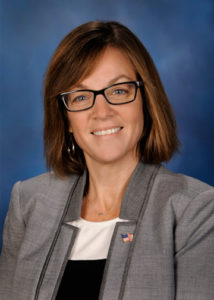COLLINSVILLE, Ill. – In response to continued outbreaks of Legionnaires’ disease at the Quincy Veterans’ Home, state Rep. Katie Stuart, D-Edwardsville, is co-sponsoring legislation to increase transparency and safety in Illinois’ veterans homes.
“The failure of the governor’s administration to act to remediate the outbreak of Legionnaires’ disease at the Quincy Veterans’ Home and the subsequent attempt to cover it up is shameful. At the very least, the residents and their loved ones should have been informed of the potential of infection,” said Stuart. “Our veterans put their lives on the line in service to us; it is imperative that we take care of them as they age in our hospitals and nursing homes.”
Thirteen veterans and their spouses have died as a result of Legionnaires’ disease with dozens more falling ill. Stuart is co-sponsoring House Bill 4278 to require veterans’ homes to notify residents along with their next of kin or emergency contact of any infectious disease outbreak. The home must also post notification of the outbreak at the front door and provide written notification to the Department of Veterans’ Affairs and the Department of Public Health. House Bill 5784 requires the Department of Veterans’ Affairs to submit quarterly reports on the health and wellness of its residents, including cases of communicable diseases.
To discuss this legislation as well as other concerns, Stuart is hosting a Veterans Issues Town Hall meeting on Wednesday, March 14 from 11 a.m. to noon at the American Legion Post 365, located at 1022 Vandalia St. in Collinsville. The event is free and open to the public.
“These bills are about increasing transparency in our state’s veterans’ homes to ensure that the public and most importantly, the veterans and their families, are fully aware of the state of the living conditions in these homes,” Stuart said. “If they don’t know of an infectious disease outbreak, then they don’t know to take the precautions and steps necessary to protect themselves. The state should do a much better job of communicating with residents and their families and taking additional steps to protect the health and safety of these veterans and their spouses.”
